Oxygen therapy for newborns and children
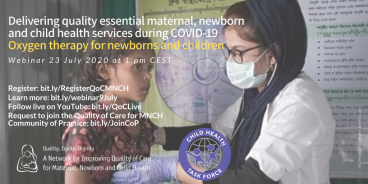
Summary: Oxygen therapy remains largely unavailable for severely ill newborns and children admitted to hospitals, and is a critical gap for the management of patients with COVID-19. This webinar described the oxygen gap that prevents newborns and children with hypoxaemia from accessing critical care, and opportunities to strengthen oxygen systems to improve the quality of care. […]
Maintaining essential MNCH services during the COVID-19 pandemic
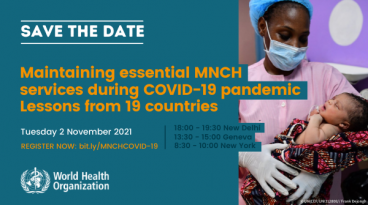
Since the beginning of the COVID-19 pandemic, WHO has engaged with countries to ensure the continuity of essential health services. Through a special initiative, the Department of Maternal, Newborn, Child, and Adolescent Health and Ageing has supported 19 countries: Bangladesh, Bolivia, Brazil, Cameroon, Democratic Republic of the Congo (DRC), Ethiopia, India, Kazakhstan, Myanmar, Nepal, Nigeria, […]
Lesson #2: Adapt and innovate to support QI teams in India and Bangladesh
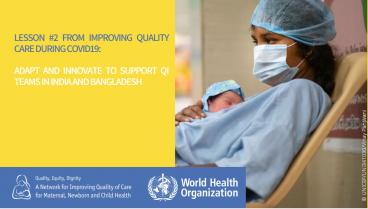
This webinar shared two examples from India and Bangladesh, where quality improvement initiatives for maternal and newborn care looked for opportunities to continue their work during COVID 19. In India, the Nationwide Quality of Care Network leveraged technology to build health workers capacity during the pandemic, and brought together a broad partnership to create a […]
Ensuring safe continuation of child health services at health facilities and in communities (iCCM/IMNCI)
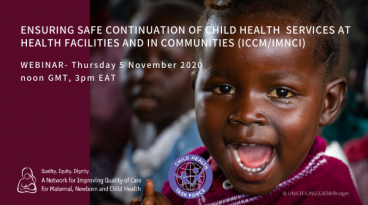
Disruptions in care seeking and access to quality health care for children at primary health facilities and in communities increase children’s risk of severe illness and death. How do countries ensure safe continuation of child health services during COVID-19? How were case management algorithms and patient flow adapted and re-organized, infection control measures implemented, PPE […]
Capitalize on remote learning and coaching
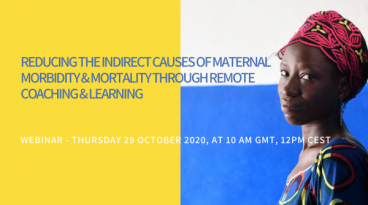
Approximately 58,000 women died during or around childbirth in Nigeria in 2015[1] and the proportion of maternal deaths due to indirect causes – such as diabetes, obesity, hypertension and anemia – is increasing in the country. This webinar shared how the project ‘Reducing the Indirect Causes of Maternal Morbidity and Mortality’ (RICOM3) – is testing a […]
Respectful maternal, newborn and young child care
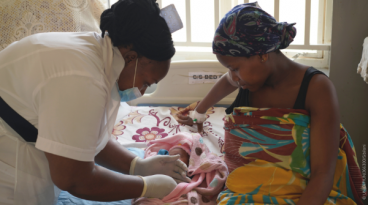
Summary: This webinar presented findings from the Breakthrough Research partnership on respectful care in Kenya and how it might inform interventions to provide respectful care to newborns and young infants during the COVID-19 response. An example from India on the challenges of maintaining respectful care during COVID19 was also shared. A representative from the White Ribbon […]
Health workers’ perspectives
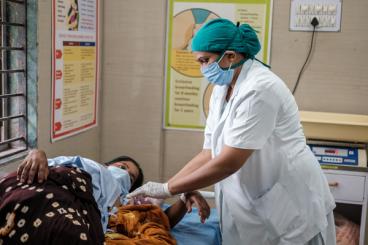
Summary COVID-19 has affected the ability of health workers to maintain quality maternal, newborn and child health services. This webinar looks into how COVID-19 has affected health workers’ ability to deliver care, how they have adapted, and how they are coping to deliver essential, quality MNCH services during the pandemic. The speakers shared findings from the recent […]
Referrals and maternal complications
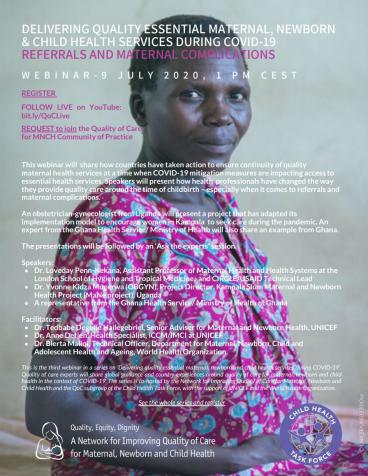
This webinar discussed measures that countries have taken to ensure continuity of quality maternal health services at a time when COVID-19 mitigation measures are impacting access to essential health services. Speakers presented how health professionals have changed the way they provide quality care around the time of childbirth – especially when it comes to referrals […]
Emergency triage and assessment
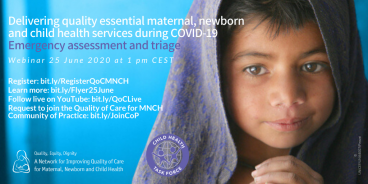
This webinar looked into how emergency triage and assessment has had to adapt during COVID-19 to ensure quality of care for maternal, newborn and child health. Speakers gave an overview of ETAT+ (Emergency Triage Assessment and Treatment Plus) whole system approach to improve emergency and admission care for children in hospitals in limited resources settings, and […]
Infection prevention & control

What does infection prevention and control (IPC) mean in the time of COVID-19? What are the IPC implications in delivering high quality essential maternal, newborn and child health services during the pandemic? An introduction to IPC recommendations for COVID-19 in the context of MNCH services gave an overview of how to set up a safe MNCH service […]